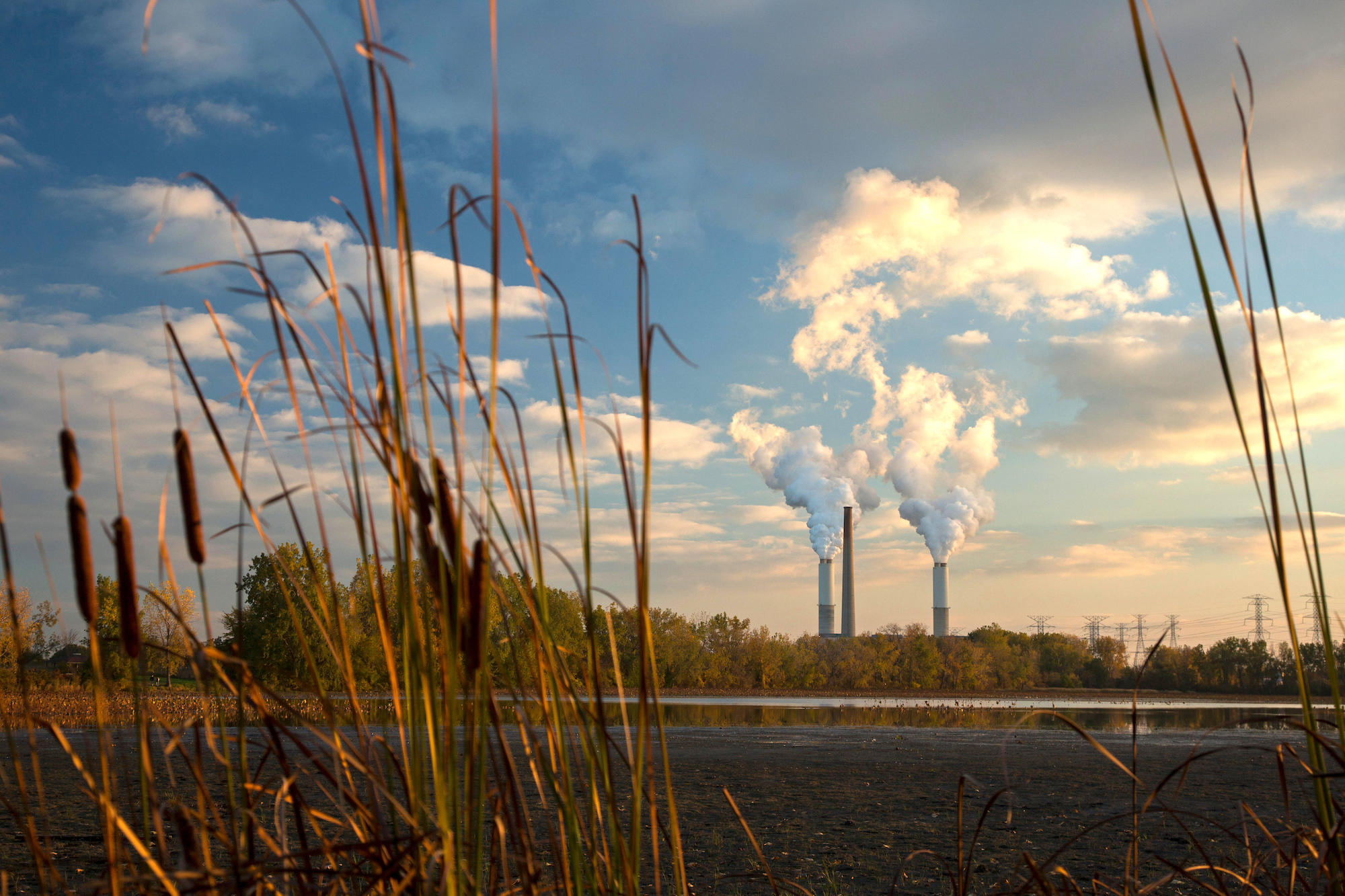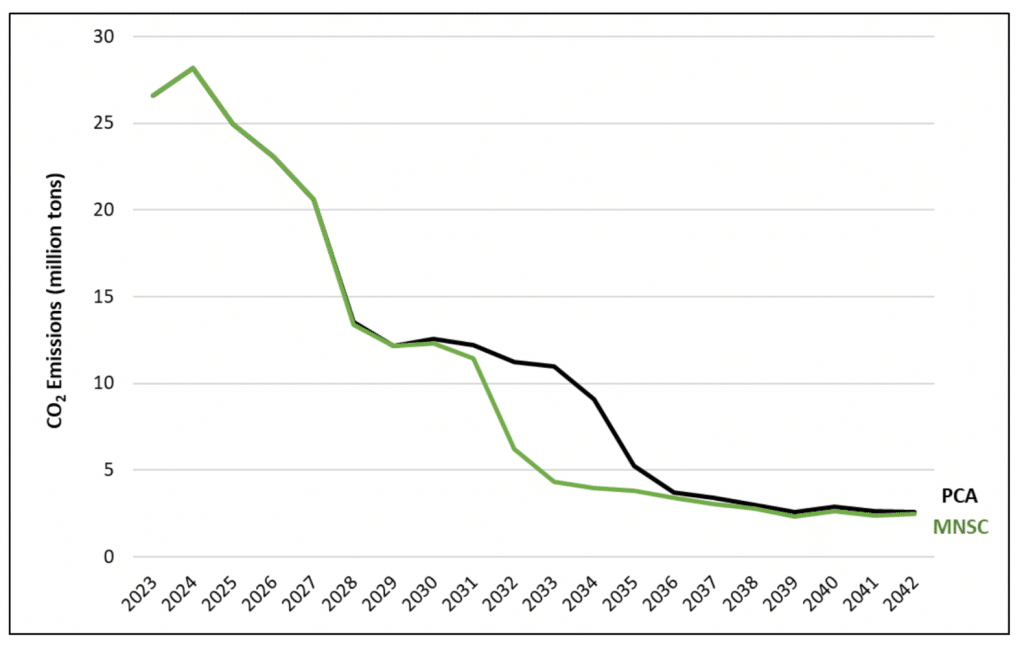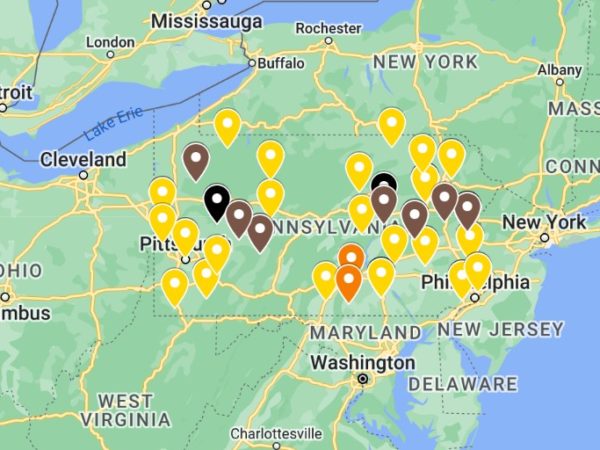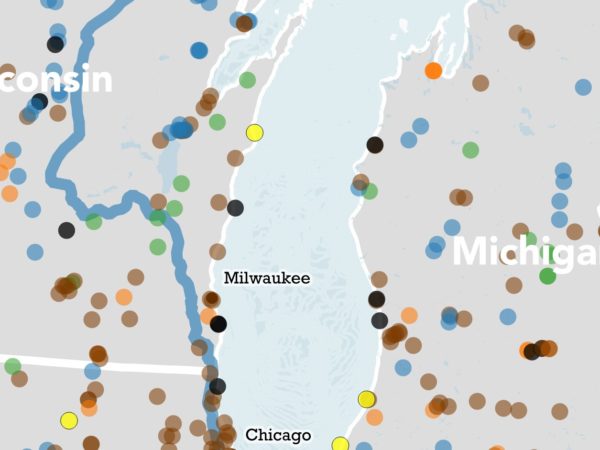
This article was republished here with permission from Planet Detroit.
By Nina Ignaczak, Planet Detroit
DTE Electric has agreed to shut down its Monroe coal-fired power plant three years ahead of schedule under a settlement agreement with environmental, business and labor groups filed Wednesday with the Michigan Public Service Commission. The company will also convert its coal-fired Belle River plant to gas under the agreement.
According to testimony citing company models, the settlement means DTE will avoid emitting an estimated 21.2 million tons of planet-warming carbon than it would have under the plan it originally submitted to the MPSC by closing the plant in 2032 instead of 2035.

Over the course of the 20-year period, intervenors’ plan (green line) resulted in 21.2 million fewer tons of carbon emitted than the DTE’s proposed course of action (black line). Excerpted from testimony in Case U-21193 on May 8, 2023.
In addition to DTE Electric, MPSC staff, and Attorney General Dana Nessel, 19 intervening organizations – including Detroit-based Soulardarity and We Want Green Too – signed the agreement, which marks a key milestone in DTE’s filing to approve its Integrated Resource Plan.
Investor-owned utilities are required to file such plans that outline how they will meet power needs over 5, 10 and 15 years. The MPSC still needs to approve the settlement.
“Today’s historic agreement is an investment in Michigan’s future,” Jerry Norcia, chairman DTE Energy’s CEO, said in a statement.
The agreement includes a substantial investment in renewable energy and storage. DTE would develop or purchase 3800 megawatts of renewable energy by 2030 – 400 more than initially proposed, enough to power more than 650,000 homes. It will also develop or purchase 780 MW of storage.
DTE also agreed to invest $70 million in low-income energy efficiency programs, contribute $30 million to organizations that provide bill assistance, and $8 million to organizations that assist low-income customers with energy efficiency improvements, renewable energy, or battery technology.
“DTE’s plan will have to prioritize BIPOC and low-income communities that have suffered the devastating public health impacts from pollution and the climate crisis first and worst,” said Gloria Lowe, Founder and CEO of We Want Green Too.
Other concessions in the agreement include required annual public disclosures of DTE’s charitable and political giving. Nessel proposed the MPSC require such disclosure earlier this year after reports that a DTE-linked dark money group funded a campaign to strip Whitmer’s lockdown authority during the pandemic.
The deal also voluntarily raises the cap on distributed solar from 1% of peak load to 6%. A bill introduced in May would remove the cap altogether, negating this provision of the agreement if passed.
DTE agreed to issue its next IRP in 2026, two years earlier than required, at which time it could come under pressure to expedite the Monroe plant’s closure even more.
In exchange for these concessions, DTE negotiated favorable financial terms that will allow it to retire its coal-fired power plants while maintaining profits for its shareholders. Under the agreement, the company will securitize portions of the net book value of its Monroe Plant and its Belle River coal-handling assets. The remaining value will be converted to a regulatory asset recoverable through customer rates, with a guaranteed return on equity at 9.0% over 15 years – a reduction from the current return of 9.9%.
Detroit advocates called the deal a victory while noting its limitations and drawbacks.
“DTE is receiving favorable financial treatment on their retiring coal plants that effectively protect their shareholders from the worst impacts of their poor investments while not extending the same fiscal protection to ratepayers,” Soulardarity and We Want Green Too said in a statement. The groups also noted that DTE won permission to convert the Monroe to a temporary gas peaker plant – a plant used for short periods during peak demand – and expects that the company will return to the MPSC to seek approval for a new gas plant to replace the capacity at Monroe.
Advocates said the agreement needs to go further.
“We’re looking to the Michigan legislature to advance the kind of bold clean energy agenda that Michiganders have made clear they’re ready for,” said Will Kenworthy, a senior regulatory director for the Midwest for Vote Solar, which is one of the intervenors in the case.
Michigan Environmental Council was one of five intervening organizations that declined to sign the agreement over the deal’s financial aspects, which it said allows DTE to prioritize shareholders over ratepayers.
“Michigan has some of the highest rates in the Midwest and energy bills are unaffordable for many,” MEC Chief Policy Officer Charlotte Jameson told Planet Detroit in a statement. “DTE was unwilling to move the needle enough when it came to protecting ratepayers, and by not signing on, the Environmental Council hopes to send a message that we demand better financial outcomes for Michiganders going forward.”
Citizens Utility Board of Michigan also declined to sign on for similar reasons.
“We think it is inappropriate for DTE shareholders to profit from these retirements and especially for DTE customers to have to pay for that shareholder profit, so we could not support the settlement, despite its positive aspects,” CUB Executive Director Amy Bandyk said in a statement.
Experts say that transitioning to clean energy as fast as possible is needed to avoid the worst impacts of climate change as the earth faces its hottest year on record and millions in the Midwest and eastern U.S. deal with smoke from wildfires burning across Canada. And with unprecedented federal money now available to support such efforts through the Inflation Reduction Act, advocates say the time to act is now.
“We have unprecedented amounts of federal funds available to make investments in clean energy, energy efficiency and to lower costs for ratepayers,” Nick Dodge, communications director for the Michigan League of Conservation Voters, said. “Members of the Legislature should now look to pass clean energy legislation that empowers the Michigan Public Service Commission to further hold utility companies accountable, seizing this moment to transition to cleaner, more affordable energy.”
Several recently introduced bills would expedite that transition. HB 4759 would set a renewable energy standard for Michigan of 60% by 2030 and a 100% carbon-free energy target by 2035, placing Michigan among the fastest states to decarbonize. HB 4760 would allow the Michigan Public Service Commission to consider climate and energy equity in its decisions, such as in rate cases and integrated resource plans. And HB 4761 would add new energy efficiency rules for utilities and require them to prioritize lower-income communities in energy efficiency projects.
Jameson said that movement on such legislation is needed to make meaningful progress.
“IRP negotiations with utilities continue to yield results that don’t go far enough,” Jameson said. “There is a very narrow path to mitigating the effects of climate change — and that path is rapidly closing. We need legislative action to transition to 100% clean energy at the pace that is required.”
Catch more news at Great Lakes Now:
What does the Supreme Court’s wetland ruling mean for Michigan?
What are wetlands for, anyway?
Featured image: DTE Energy’s Monroe Power Plant, the second-largest coal-fired power plant in the United States. (Photo credit: Jim West / Alamy Stock Photo)




